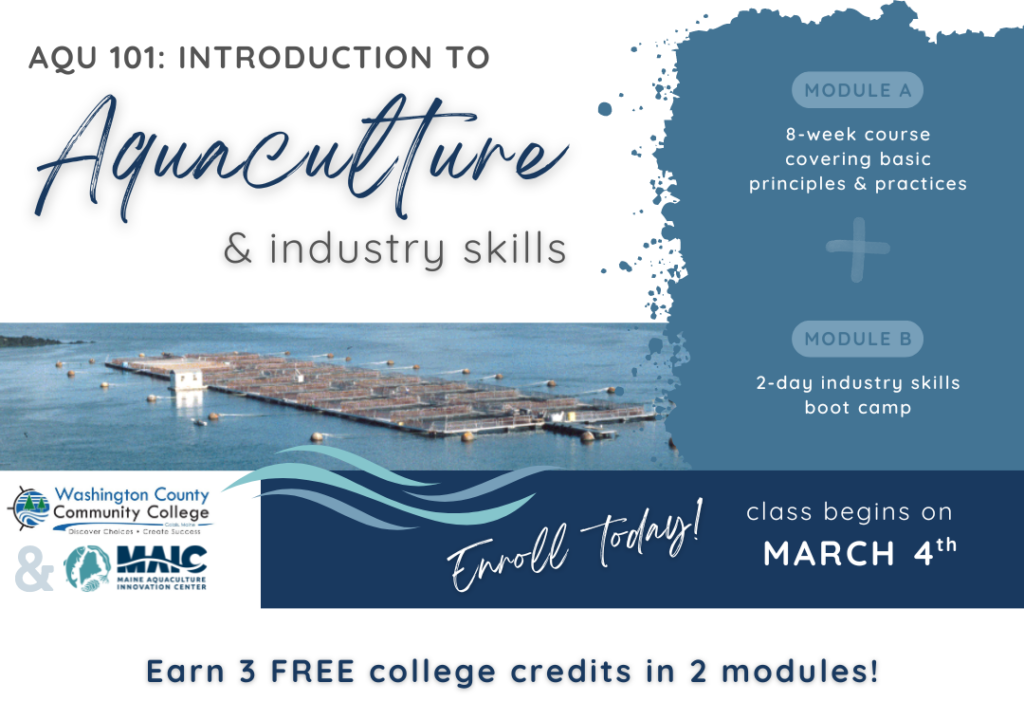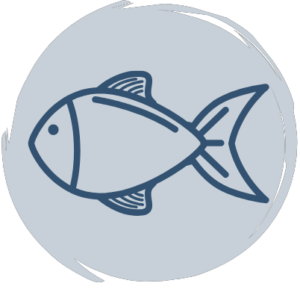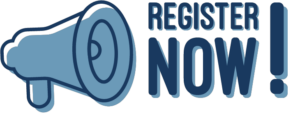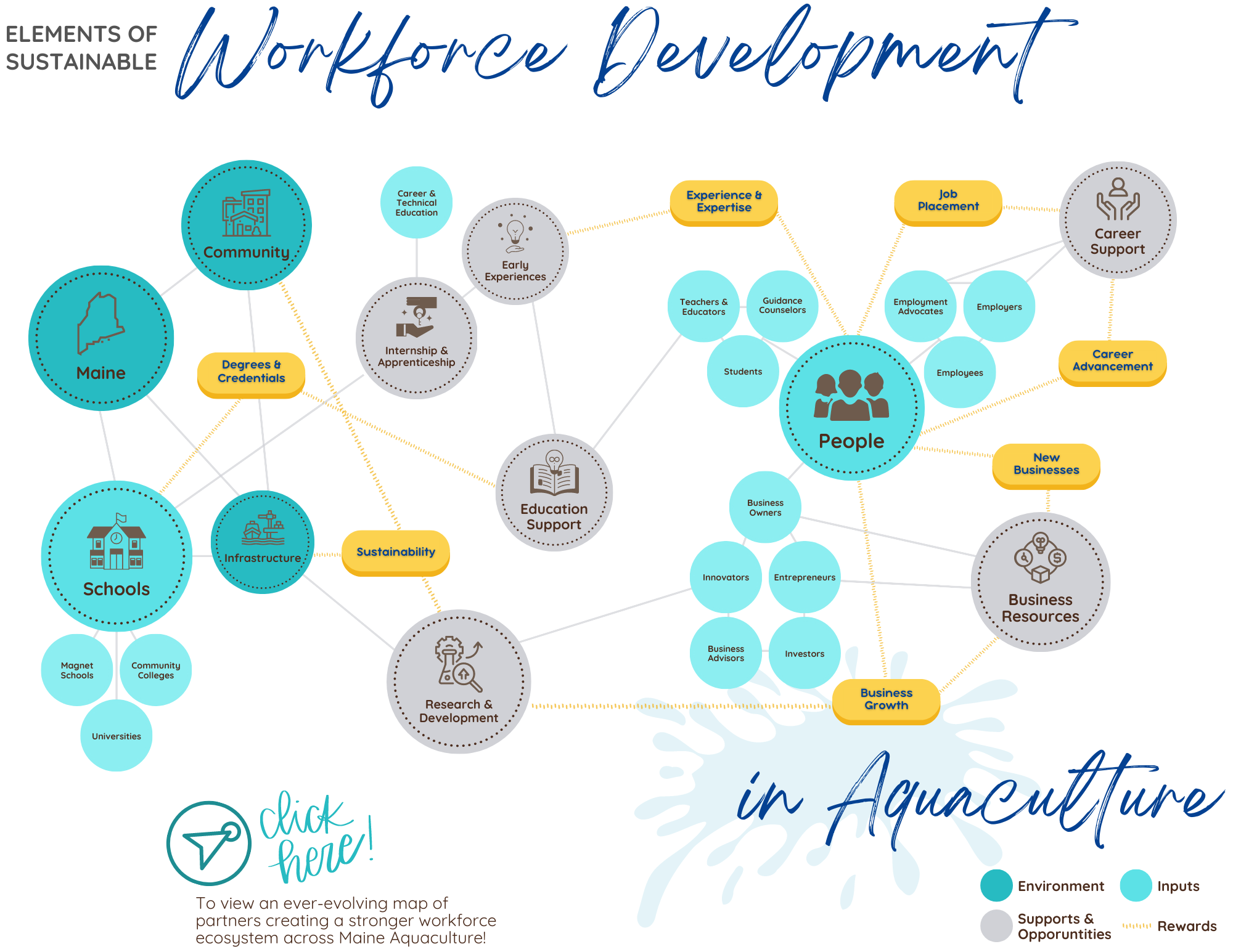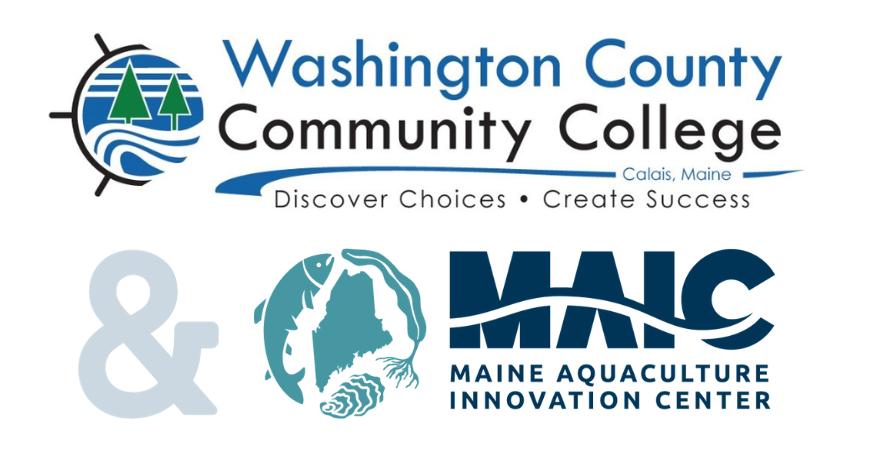Discover Careers in Aquaculture
QUESTIONS?
Please contact WCCC Workforce & Professional Development Department workforce@wccc.me.edu or (207) 214-7988
Washington County Community College (WCCC) and Maine Aquaculture Innovation Center (MAIC) have joined forces with partners, to bring you…
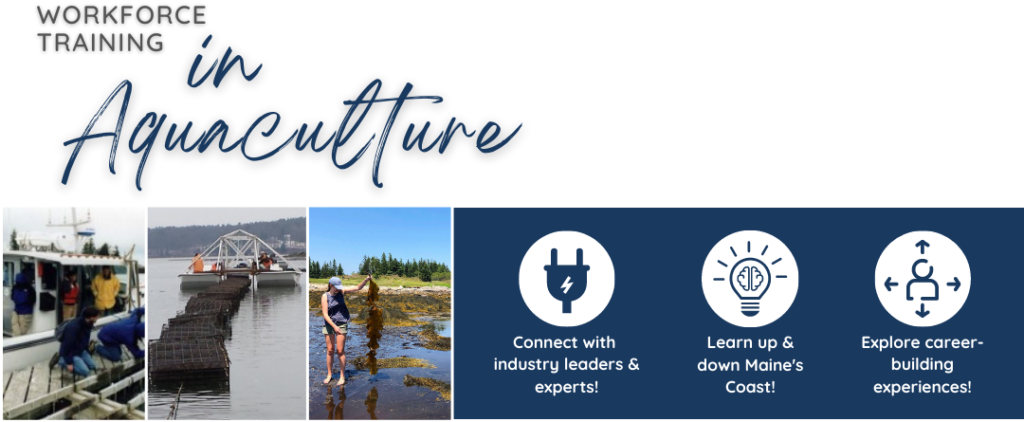
Programming is designed and led by Industry!
This program has been developed with funding from a USDA Agricultural Food & Research grant in partnership with the Maine Aquaculture Innovation Center and is grounded in numerous organizational and industry partnerships which will be key to delivering the industry designed programming. Students will have the opportunity to start careers in the aquaculture sector statewide, as well as transfer into four-year programs.
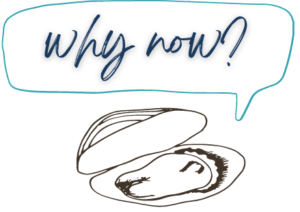
Maine’s Aquaculture Industry is very diverse. Maine’s extensive, sparsely developed, 3,500-mile coastline and proximity to the nutrient rich waters of the Gulf of Maine have favored an economy based on marine resources, and strong economic and cultural traditions, connecting working waterfronts to the sea. It incorporates freshwater and marine farming, of fish, shellfish, and aquatic plants. Marine farming in Maine dates from the late 1960s when the state adopted statutes and regulations for leasing of state-owned areas in coastal waters below the mean low tide mark. Maine has supplied North American markets with seafood for 200 years and has earned a reputation for high quality and sustainably produced or harvested seafood.
According to the Maine Aquaculture Association, in 2018 there were 190 individual aquatic farms in Maine operated by lease holders, and 200 additional leaseholders who had yet to develop their businesses. Maine’s aquaculture sector has a direct economic impact of $73.4 million in output, and $35.7 in labor income. Since 2007, the total economic impact of aquaculture has almost tripled from $50 million to $137 million. In 2016, the industry employed 571 with many jobs related to aquaculture production as full-time, all-year positions. Less than 30% of employment were seasonal (Cole et al. 2017).
In the twentieth century, wild harvests of fish and shellfish have declined because of overharvesting, disruption of marine ecosystems, and most recently from the impacts of climate change (warming waters, ocean acidification and the threat of invasive species). By providing coastal communities the means to farm the sea, we can simultaneously support the sustainable expansion of marine aquaculture, reduce the U.S. seafood trade deficit, improve U.S. food security, increase the resilience of coastal communities, and maintain coastal cultural and economic traditions associated with the working waterfront.
UPCOMING CLASSES AND MODULES! BEGINNING IN JANUARY 2024…

BIO 112 – Marine Biology is FREE and runs January 21 through May 25, 2024! BIO 112 is an asynchronous course offering 4 college credits. Throughout the course, students will discover marine environments and their biotic communities while exploring the natural history of marine organisms.

Over the course of March through May of 2024, AQU 101 Introduction to Aquaculture and Industry Skills – Module A will provide learners with an introduction to the basic principles and practices of aquaculture from local, national and international perspectives. Learners will gain a basic understanding of the parameters that contribute to a successful aquafarm, and factors controlling the growth and development of the aquaculture industry. In May of 2024, Module A will be followed up by AQU 101L Introduction to Aquaculture and Industry Skills – Module B which ties in the skills learning and demonstration phase of the course via a 2-day, in-person Aquaculture Career Skills Boot Camp. This immersive skills-learning experience will provide experiential, hands-on training of basic aquaculture skills that are listed within the Maine Aquaculture Association’s Occupational Standards for entry-level aquaculture positions, including but not limited to knot-tying, water safety, boat navigation, trailering, use of basic lab equipment, mooring design etc.
AQU 101 INTRODUCTION TO AQUACULTURE – Module A offers 2 college credits
Upon successful completion of this course, the student should be able to:
- Gain a historic and global overview of aquaculture
- Demonstrate an understanding of shellfish species farmed globally, nationally and within Maine
- Demonstrate an understanding of marine and freshwater fin fish species farmed globally, nationally and within Maine
- Demonstrate an understanding of aquatic environments, water quality, and water treatment through learning how to use and apply ocean observation platforms
- Identify examples of intensive and extensive aquaculture systems in shellfish, fin fish, and algae sectors
- Evaluate physical, chemical, and biological aspects of aquaculture site and create a site selection plan through learning how to use and apply Google Earth and GIS applications
- Demonstrate an understanding of micro and macro algal species farmed for food, pharmaceuticals, and other uses globally, nationally and within Maine
- Compare and contrast controversial and non-controversial aquaculture lease processes through a gained understanding of social, regulatory, and economic aspects of site selection including distribution, logistics and markets
Course Schedule
There will be 2 lessons per week, with the exception of Week 1. All weekly lessons will be conducted via Zoom (2 hours per week class) and instructors will provide connection links each week. The class scheduled is as follows. Schedule if subject to change.
Week 1: Introduction to Aquaculture
Monday, March 4
Thursday, March 7
Thursday, March 14
Week 2: Culture Systems
Monday, March 18
Thursday, March 21
Week 3: Site Selection
Monday, March 25
Thursday, March 28
Week 4: Shellfish
Monday, April 1
Thursday, April 4
Week 5: Fin Fish
Thursday, April 11
Thursday, May 2
Week 7: Algae
Monday, May 6
Thursday, May 9
Week 8: Social, Regulatory, and Economic Aspects of Aquaculture
Monday, May 13
Thursday, May 16
AQU 101L INTRODUCTION TO AQUACULTURE – Module B offers 1 college credit
2-DAY SKILLS BOOT CAMP in May 2024 (dates to be announced soon!)
Upon successful completion of this course, the student should be able to:
- Demonstrate basic water safety and navigation skills
- Demonstrate boat trailering skills
- Demonstrate basic lab equipment functionality pertaining to aquaculture careers.
- Identify basic knots used in marine careers and effectively demonstrate how to tie each knot.
- Demonstrate the basics of mooring design, construction and deployment.

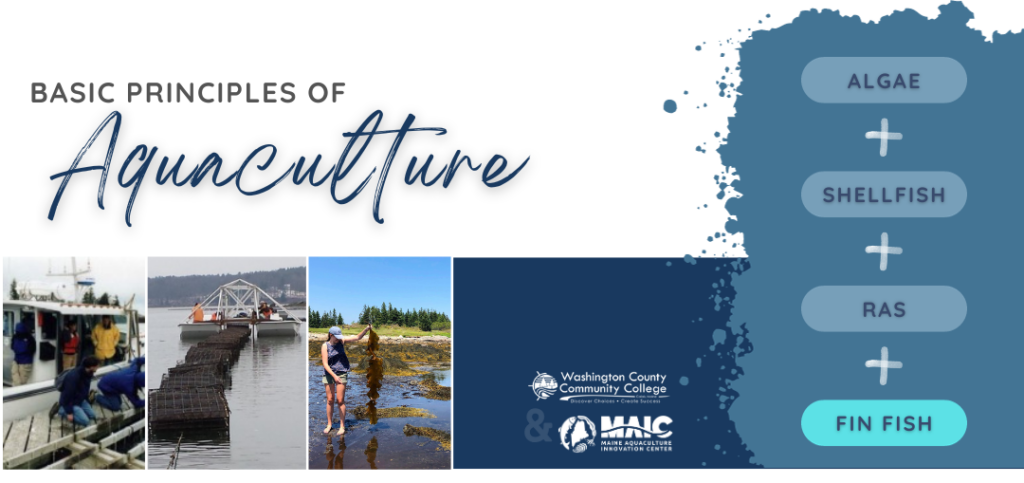
Basic Principles of Aquaculture is comprised of 4, 1-credit hybrid modules, running Oct. 10th through Jan. 30th! Each module includes 1 in-person day (4 in-person days total across all modules, resulting in 1 in-person day per month)
The objective of this course is to introduce basic principles of aquaculture. Students are introduced to environmental, social and economic aspects of each of the four sub-sectors, including topics such as site selection, feeding and nutrition, reproduction, breeding, disease and biosecurity, aquaculture systems, and husbandry.
The Basic Principles of Aquaculture Fin Fish Module (4 of 4) begins on January 16th. There is still time to register!
AQU 116: FIN FISH AQUACULTURE – 1 CH (begins January 16, 2024)
AQU 116 will introduce students to the basic principles of finfish aquaculture. Students will be introduced to environmental, social and economic aspects of the sub-sector, including topics such as site selection, feeding and nutrition, reproduction, breeding, disease and biosecurity, aquaculture systems, and husbandry. This will include principles of recirculating aquaculture systems (RAS) including the rationale of using RAS vs flow through systems; the fundamentals of water chemistry, water quality and measurement; components and design of RAS systems; and production, husbandry and management of RAS operations.
Upon successful completion of this course, the student should be able to:
- Describe the fin fish anatomy
- Compare and contrast the approach to hatchery and nursery production of an extensively produced species and intensively produced species
- Evaluate open water finfish production systems using a SWOT analysis approach
- Describe the role of Atlantic salmon hatcheries in conservation efforts
- Describe a species fish species, what it is used for, where and how it is farmed, and the nutritional value
AQU 116 Schedule
Week 1 – Fin Fish Biology
Week 2 – Fin Fish Hatchery & Nursery Systems
Week 3 – Production Systems
Week 4 – Introduction to Fin Fish Aquaculture (in-person 8-hour class)
Week 5 – Regulatory Aspects and Biosecurity & Public Health
Other sub-sector modules in this 4-credit course include:
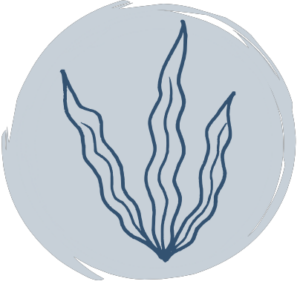
AQU 113: ALGAE AQUACULTURE – 1 CH (began October 10, 2023)
AQU 113 introduces students to the basic principles of micro and macro algal aquaculture. Students are introduced to environmental, social, and economic aspects of the sub-sector, including topics such as site selection, feeding and nutrition, reproduction, breeding, disease and biosecurity, aquaculture systems, husbandry and culture systems.
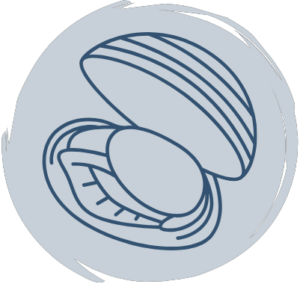 AQU 114: SHELLFISH AQUACULTURE – 1 CH (began October 31, 2023)
AQU 114: SHELLFISH AQUACULTURE – 1 CH (began October 31, 2023)
AQU 114 introduces students to the basic principles of shellfish aquaculture including environmental, social, and economic aspects of the sub-sector, including. Students explore topics such as site selection, feeding and nutrition, reproduction, breeding, disease and biosecurity, aquaculture systems, and husbandry.
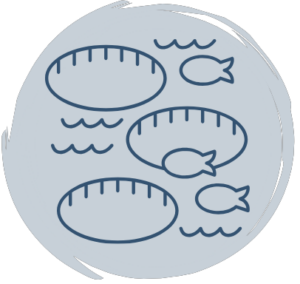 AQU 115: RECIRCULATING AQUACULTURE SYSTEMS (RAS) – 1 CH (began December 5, 2023)
AQU 115: RECIRCULATING AQUACULTURE SYSTEMS (RAS) – 1 CH (began December 5, 2023)
AQU 115 introduces students to the basic principles of recirculating aquaculture systems (RAS). Students are introduced to the rationale of using RAS versus flow thru and open water systems; the fundamentals of water chemistry, water quality and measurement; components and design of RAS systems; and production, husbandry and management of RAS operations.


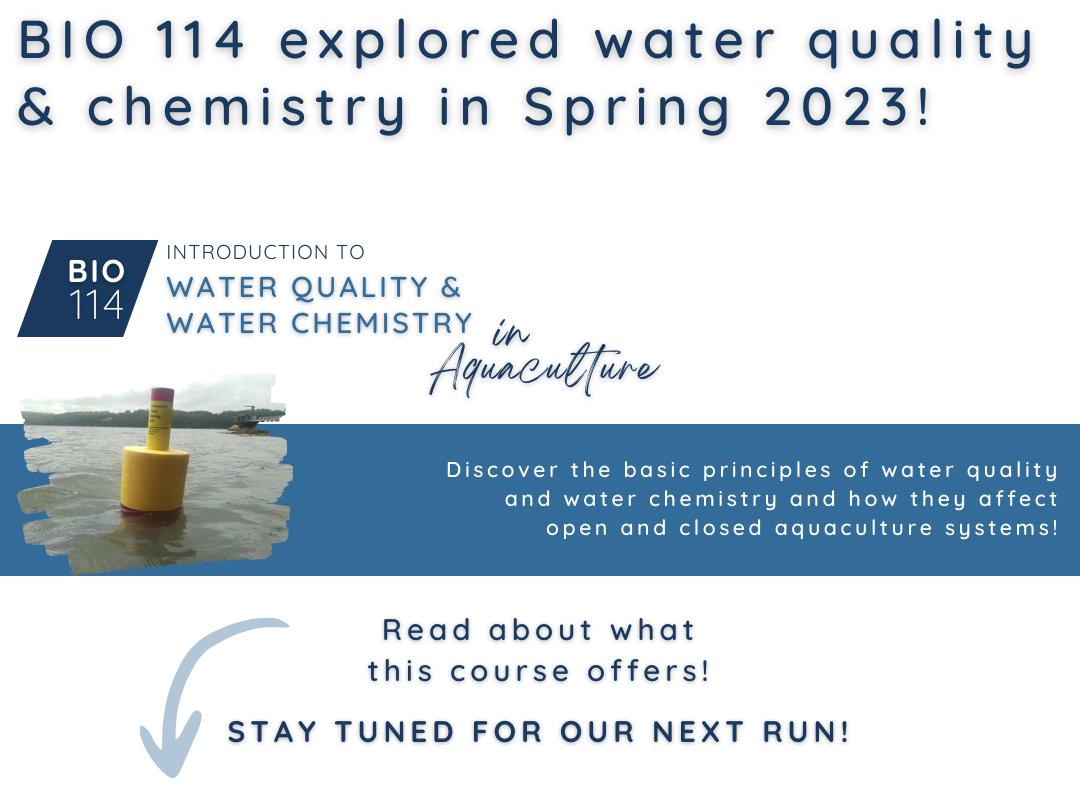
Over the course of January through March of 2023, AQU 101 Introduction to Aquaculture and Industry Skills – Module A provided learners with and introduction to the basic principles and practices of aquaculture from local, national and international perspectives. Learners gained a basic understanding of the parameters that contribute to a successful aquafarm, and factors controlling the growth and development of the aquaculture industry. In May of 2023, Module A will be followed up by AQU 101 Introduction to Aquaculture and Industry Skills – Module B which ties in the skills learning and demonstration phase of the course via a 2-day, in person Aquaculture Career Skills Boot Camp. This immersive skills learning experience will provide experiential, hands-on training of basic aquaculture skills that are listed within the Maine Aquaculture Association’s Occupational Standards for entry-level aquaculture positions, including but not limited to knot-tying, water safety, boat navigation, trailering, use of basic lab equipment, mooring design etc.
Running May through June of 2023, this 9-day course introduced learners to the basic principles of water quality and water chemistry and how they affect open and closed aquaculture systems. Students gained an understanding of the chemical properties of marine and fresh water and the impacts on farmed species when water quality becomes out of balance. Specific water quality parameters covered included pH, salinity, temperature, nutrients, dissolved oxygen, microbes, and pollutants. The hybrid course wrapped up with a 2-day skills learning and demonstration experience. Throughout the 9-day course, 9 students became proficient with tools and instruments commonly used to measure water quality conditions on farm sites and earned 2 FREE college credits!
Check out our BIO 114 lineup!
Upon successful completion of this course, the students were be able to:
- Describe the foundational water quality principles in aquaculture
- Explain the relationship between temperature and growth rates
- Demonstrate an understanding of the role of turbidity, light, and total suspended solids in aquaculture
- Demonstrate an understanding of the role of dissolved oxygen and the importance of aeration
- Demonstrate an understanding of the role of pH, alkalinity, and carbon dioxide in aquaculture
- Demonstrate an understanding of the role of nitrogen species in aquaculture
- Demonstrate an understanding of the role of good and bad microorganisms in aquaculture
- Demonstrate an understanding of water quality and chemistry in aquaculture and their role in animal/plant welfare and influence on the production of Maine’s key species
- Demonstrate basic skills required of entry-level aquaculture positions (including but not limited to use of basic lab equipment, measurements, assessing levels, etc.
Day 1: Introduction to Water Quality in Aquaculture
Day 2: Temperature
Day 3: Turbidity & Solids
Day 4: Oxygen
Day 5: pH, Alkalinity & Carbon Dioxide
Day 6: Nitrogen, Nitrates, Nitrites & Ammonia
Day 7: Micro Organisms
Day 8 & Day 9 (in-person): Water Quality Maintenance & Measurement
Days 8 and 9 of BIO 114 consisted of a 2-day in-person skills demonstrations and practice. Each 8-hour day will entirely consisted of simultaneous instruction and hands-on learning. Basic skills included, but were not limited to, measuring and monitoring temperature, the use of basic lab equipment, assessing levels, etc. Basic water quality management skills were sourced from the desired skills included in the Maine Aquaculture Association’s Occupational Standards for entry-level aquaculture positions.

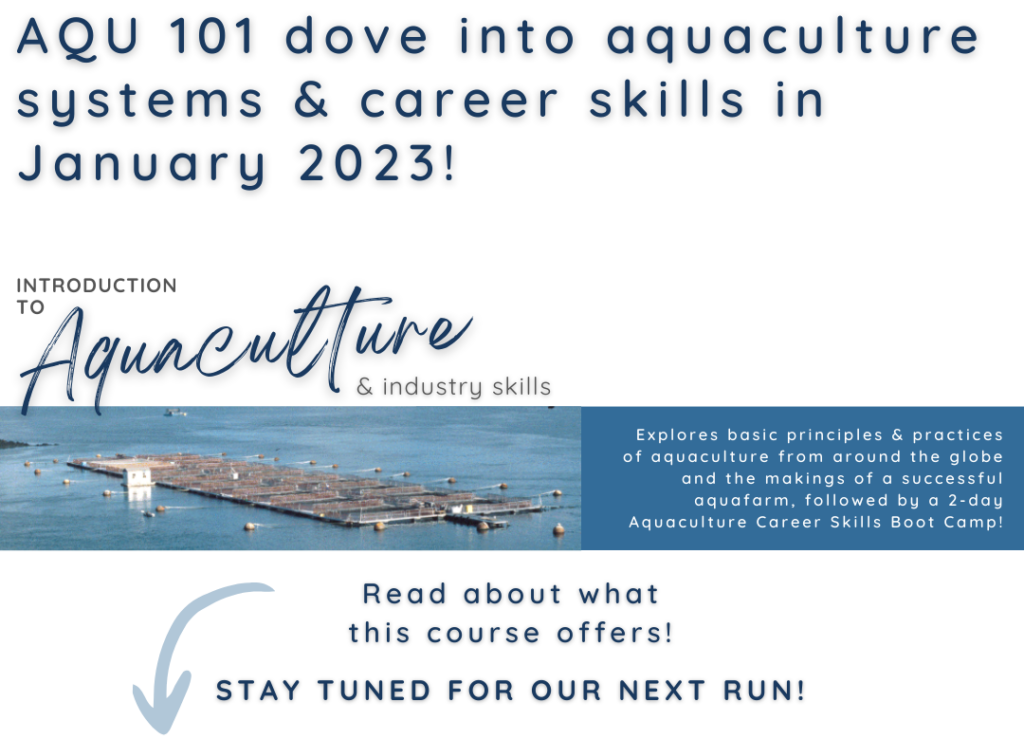
Over the course of January through March of 2023, AQU 101 Introduction to Aquaculture and Industry Skills – Module A provided learners with and introduction to the basic principles and practices of aquaculture from local, national and international perspectives. Learners gained a basic understanding of the parameters that contribute to a successful aquafarm, and factors controlling the growth and development of the aquaculture industry. In May of 2023, Module A will be followed up by AQU 101 Introduction to Aquaculture and Industry Skills – Module B which ties in the skills learning and demonstration phase of the course via a 2-day, in person Aquaculture Career Skills Boot Camp. This immersive skills learning experience will provide experiential, hands-on training of basic aquaculture skills that are listed within the Maine Aquaculture Association’s Occupational Standards for entry-level aquaculture positions, including but not limited to knot-tying, water safety, boat navigation, trailering, use of basic lab equipment, mooring design etc.
Check out our AQU 101 lineup!
AQU 101 INTRODUCTION TO AQUACULTURE – Module A
Upon successful completion of this course, the student should be able to:
- Gain a historic and global overview of aquaculture
- Demonstrate an understanding of shellfish species farmed globally, nationally and within Maine
- Demonstrate an understanding of marine and freshwater fin fish species farmed globally, nationally and within Maine
- Demonstrate an understanding of aquatic environments, water quality, and water treatment through learning how to use and apply ocean observation platforms
- Identify examples of intensive and extensive aquaculture systems in shellfish, fin fish, and algae sectors
- Evaluate physical, chemical, and biological aspects of aquaculture site and create a site selection plan through learning how to use and apply Google Earth and GIS applications
- Demonstrate an understanding of micro and macro algal species farmed for food, pharmaceuticals, and other uses globally, nationally and within Maine
- Compare and contrast controversial and non-controversial aquaculture lease processes through a gained understanding of social, regulatory, and economic aspects of site selection including distribution, logistics and markets
Week 1: Introduction to Aquaculture
Week 2: Introduction to Aquaculture
Week 3: Culture Systems
Week 4: Site Selection
Week 5: Shellfish
Week 6: Fin Fish
Week 7: Algae
Week 8: Social, Regulatory, and Economic Aspects of Aquaculture
AQU 101L INTRODUCTION TO AQUACULTURE – Module B
2-DAY SKILLS BOOT CAMP
Upon successful completion of this course, the student should be able to:
- Demonstrate basic water safety and navigation skills
- Demonstrate boat trailering skills
- Demonstrate basic lab equipment functionality pertaining to aquaculture careers.
- Identify basic knots used in marine careers and effectively demonstrate how to tie each knot.
- Demonstrate the basics of mooring design, construction and deployment.

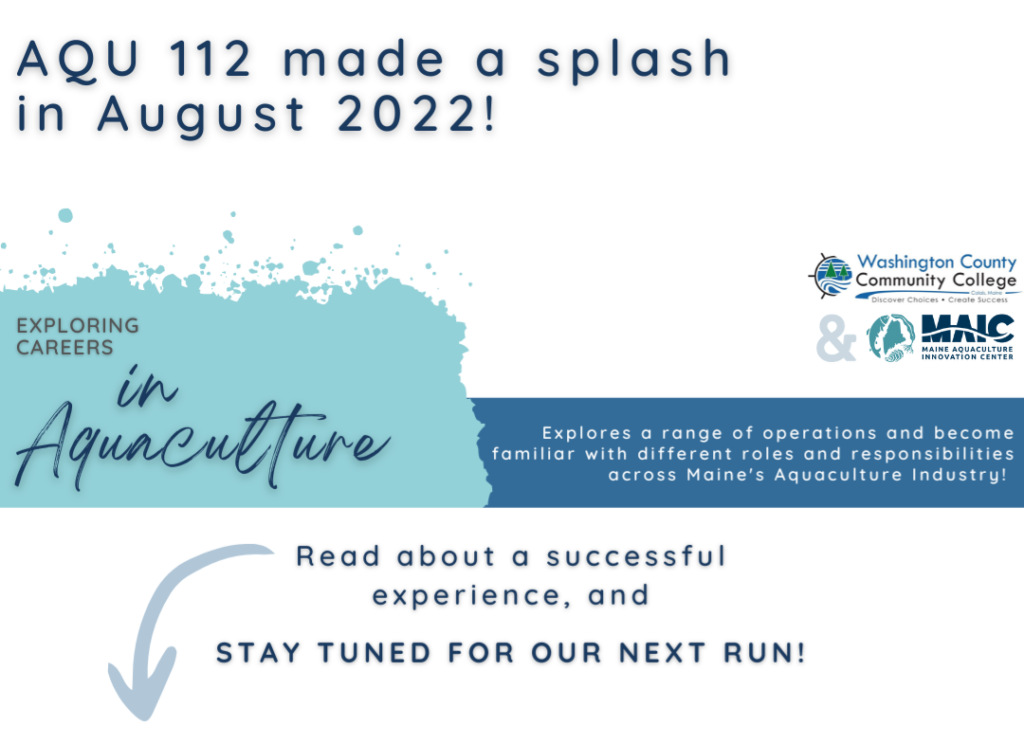
In August of 2022, AQU 112 Exploring Careers in Aquaculture brought a small cohort of five students along a journey across aquaculture careers in Eastern Maine! Lodging, travel, and meal accommodations were coordinated by MAIC and WCCC, funded by USDA’s AFRI Education and Workforce Development Program, and provided at Downeast Institute on Beals Island. Students visited a range of aquaculture operations and become familiar with different roles and responsibilities and related pathways, which included field trips to shellfish, algae and fin fish hatcheries, land-based recirculating aquaculture operations, marine-based fin fish and shellfish operations, processing facilities, and research facilities. Students met with people across a broad range of careers including farming/production, biotechnology, processing, distribution and transport, gear/equipment manufacturing, veterinarians and aquatic animal health professionals, entrepreneurship, sales, marketing, advocacy, education, policy and regulation, research, engineering, food science, and more!
Check out our AQU 112 lineup!
Day 1 – Zoom Classroom
Cohort Orientation, Course Introduction, and Introduction to Aquaculture Careers across the globe
Day 2 – on-site at Downeast Institute (DEI)
Tour of DEI & Exploring careers in shellfish/fin fish aquaculture production
Day 3 – field excursion to Eastport
Exploring careers in fin fish aquaculture production, advocacy & education
Day 4 – field excursion to Trenton
Exploring careers in shellfish aquaculture production (oysters, scallops & mussels) and seaweed production
Day 5 – field excursion to Franklin
Exploring careers in seaweed processing, aquaculture research & fin fish aquaculture
Day 6 – field excursion to East Machias
Exploring careers in conservation & education
Day 7 – Zoom Classroom
Bringing it all together & cohort video presentations

At the end of the 7-day August 2022 course, the first Aquaculture Apprenticeship in Maine was established! Mandy Everett, an Exploring Careers in Aquaculture student, worked with Nichole Sawyer, WCCC Dean of Workforce & Professional Development and Megan Sorby, Kingfish Maine Operations Manager, to establish a transition into a full-time RAS Technician position.
What students in future runs of AQU 112 can expect
AQU 112 Exploring Careers in Aquaculture continues to offer hands-on, immersive group learning experiences in an accelerated format and includes 2 days of orientation and cohort-building activities and 5 days of career and industry learning experiences. Students who successfully complete the course will receive 3 college credits, for free!
Day 1 and Day 7 are delivered asynchronously via Zoom. Day 2 through Day 6 are in-person* career excursions.
AQU 112 is a residential course whereby students stay on a designated campus or make arrangements to meet the cohort on campus each day for field trip transportation.
*Lodging, meals, and transportation accommodations will be provided. It is a requirement that all participants be at least 18 years old. Up to date COVID-19 vaccinations and available booster vaccinations are required.


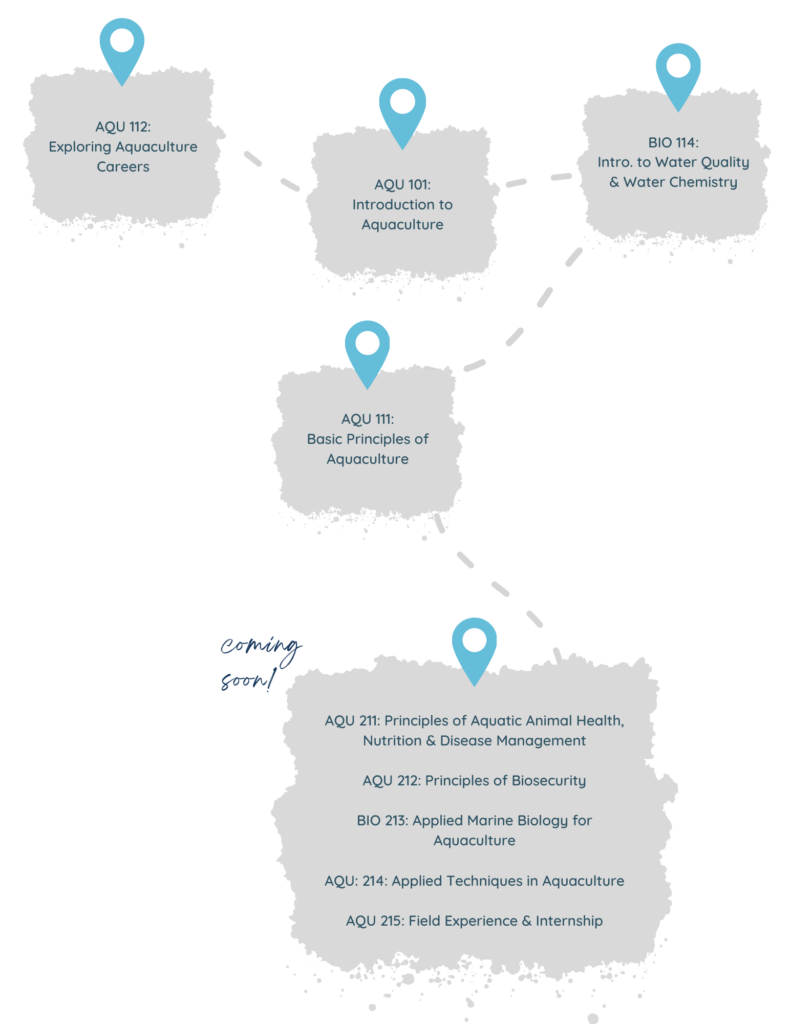
You are supported now, and into the future!
Maine aquaculture enthusiasts, students, teachers, business owners, communities and innovators are well-supported through programs, partnerships and opportunities. Click on the workforce ecosystem map below to view an ever-growing, ever-connecting chain of available supports and resources! Check back frequently, as we are continually adding and updating learning opportunities and resources!

Washington County Community College does not discriminate on the basis of color, religion, national origin, sex, sexual orientation, disability, age or marital, parental, or veteran’s status in its programs and activities.
QUESTIONS?
Please contact WCCC Workforce & Professional Development Department
workforce@wccc.me.edu or (207) 214-7988
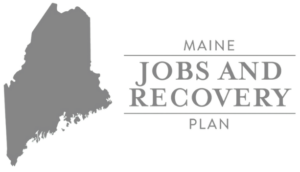
These programs are funded by USDA’s AFRI Education and Workforce Development Program and Maine Jobs & Recovery Plan, in partnership with WCCC, and Maine Aquaculture Innovation Center.





